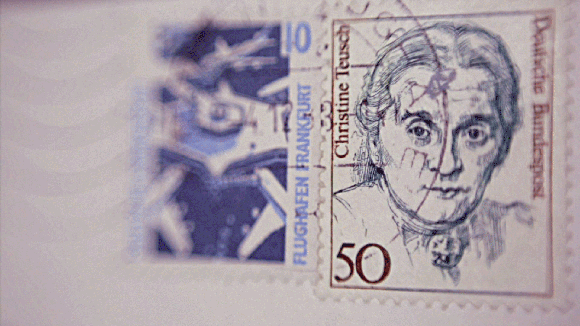★★★★ Dear Peter
Dear Peter reviewed by Andrew Robertson for Eye For Film. Can be read here.
“The story told is one that is fairly judged, well constructed, moving.”
A collection of postcards, works of art, slices of a life, all addressed the same – Dear Peter. In a secondhand shop, an essay on identity in epistolary ephemera, a span of 70 years in the selection found by writer/director Scott Willis. A mystery, a puzzle, to be far more impersonal than this film ever is an important node in a network implied. Peter. Dear Peter.
In a Q&A at 2016’s Glasgow Film Festival, Scott hinted at the original intent of the film, a short short about a short subject – an individual made apostrophe by post, a portrait of an unseen addressee. However, his diligence is reflected by more than checking and rechecking the suitability of headphone volume. He wrote to the address on the postcards, and to the senders where the detail was supplied. No answer from many, from most, no answer until something came in the post.

We hear the telephone conversation – that post was prologue – as Peter answers the call from “Scott from Scotland”. A voice, at first, and then a face – a life, a man, a Peter who is dear. We get an explanation of the circumstances, of the steps that lead us towards this karmic connection, of who Peter is and was and how those cards came to be Scott’s. The story told is one that is fairly judged, well constructed, moving.
Reunited with a part of what was a much greater collection of picture post-cards, there is a discussion of grief – grieved to be reunited with something that had been accepted as lost, grieved to be reminded of friends now gone, grieved (and even aggrieved) by time, by change. Faith informs Peter’s worldview. After his ‘down-sizing’ there is still room for a shelf full of books of carols, space for skepticism, the phrase “thou good and faithful servant”. In that discussion of talents (Matthew 25:21) the subject is coin, not just craft, but in this documentary Willis demonstrates his. Abstractions from the surface of the postcards, focus on the materiality of printing, typing, and then the interviews, all produce something relatable, recommended.
Documentary is about more than pointing a camera at a subject – if either tale or telling is interesting then a documentary will be good, but to achieve both takes effort, ensures success. Dear Peter won the Scottish Audience award at 2016’s Glasgow Film Festival, and deserves plaudits. Fate gave Willis an opportunity, and his efforts have rewarded him. For unto every one that hath shall be given, and he shall have abundance.
Reviewed on: 21 Mar 2016

